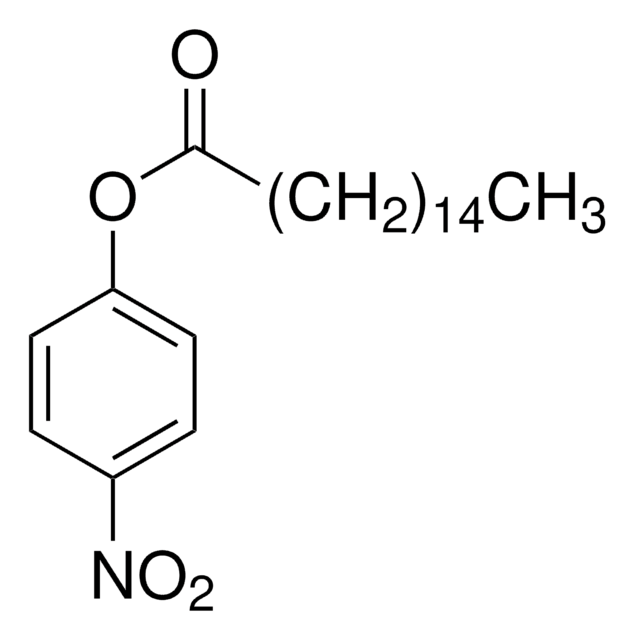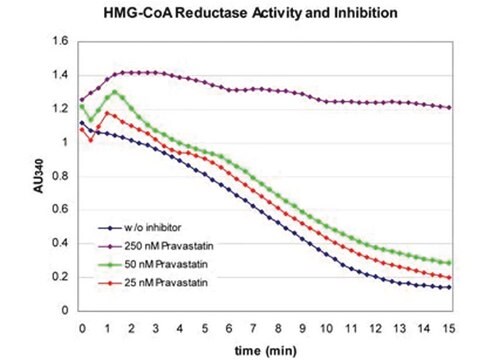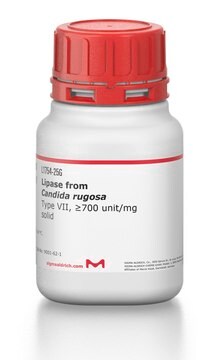MAK046
Lipase Activity Assay Kit
sufficient for 100 colorimetric tests (with glycerol standard)
Sign Into View Organizational & Contract Pricing
All Photos(3)
About This Item
UNSPSC Code:
12161503
NACRES:
NA.84
Recommended Products
usage
sufficient for 100 colorimetric tests (with glycerol standard)
detection method
colorimetric
relevant disease(s)
pulmonary disorders; gastrointestinal diseases; cancer
storage temp.
−20°C
General description
The lipase family of enzymes catalyze the cleavage of the ester bonds of lipids. In mammals, this family includes many critical members including pancreatic, hepatic, endothelial, and lipoprotein lipase. Lipases, such as pancreatic lipase, are critical for the metabolism of lipids. Lipases also play key roles in processes such as cell signaling and inflammation. Measurements of lipase activity are commonly used to screen for pancreatic injury or disease, and to monitor diseases such as cystic fibrosis, celiac disease, and Crohn′s disease.
Application
Lipase Activity Assay Kit has been used to determine the lipase activity in samples.
Features and Benefits
Compatible with high-throughput handling systems.
Suitability
Suitable for the detection of lipase activity in biological samples including tissue, cells and serum
Principle
The Lipase Activity Assay kit provides a simple and direct procedure for measuring lipase activity in a variety of samples. Lipase activity is determined using a coupled enzyme reaction, which results in a colorimetric (570 nm) product proportional to the enzymatic activity present. One unit of Lipase is the amount of enzyme that will generate 1.0 μmole of glycerol from triglycerides per minute at 37 °C.
related product
Product No.
Description
Pricing
replaced by
Product No.
Description
Pricing
Signal Word
Danger
Hazard Statements
Precautionary Statements
Hazard Classifications
Eye Dam. 1 - Resp. Sens. 1 - Skin Irrit. 2 - Skin Sens. 1 - STOT SE 3
Target Organs
Respiratory system
Storage Class Code
10 - Combustible liquids
Flash Point(F)
188.6 °F - closed cup
Flash Point(C)
87 °C - closed cup
Certificates of Analysis (COA)
Search for Certificates of Analysis (COA) by entering the products Lot/Batch Number. Lot and Batch Numbers can be found on a product’s label following the words ‘Lot’ or ‘Batch’.
Already Own This Product?
Find documentation for the products that you have recently purchased in the Document Library.
Customers Also Viewed
Enhanced absorption of long-chain polyunsaturated fatty acids following consumption of functional milk formula, pre-digested with immobilized lipase ex vivo, in an exocrine pancreatic insufficient (EPI) pig model.
Goncharova K, et al.
Journal of functional foods, 34, 422-430 (2017)
Effect of phenolic hydroxyl groups on inhibitory activities of phenylpropanoid glycosides against lipase.
Wu X, et al.
Journal of functional foods, 38, 510-518 (2017)
Jeong Kuk Park et al.
IUCrJ, 6(Pt 4), 729-739 (2019-07-19)
Ependymin was first discovered as a predominant protein in brain extracellular fluid in fish and was suggested to be involved in functions mostly related to learning and memory. Orthologous proteins to ependymin called ependymin-related proteins (EPDRs) have been found to
Amélie de Vallée et al.
Frontiers in microbiology, 10, 2829-2829 (2019-12-24)
The gray mold fungus Botrytis cinerea is a necrotrophic pathogen able to infect hundreds of host plants, including high-value crops such as grapevine, strawberry and tomato. In order to decipher its infectious strategy, a library of 2,144 mutants was generated
Mackenzie Moore et al.
Biology, 11(3) (2022-03-27)
Acute pancreatitis (AP) involves premature trypsinogen activation, which mediates a cascade of pro-inflammatory signaling that causes early stages of pancreatic injury. Activation of the transcription factor κB (NF-κB) and secretion of pro-inflammatory mediators are major events in AP. O-GlcNAc transferase
Our team of scientists has experience in all areas of research including Life Science, Material Science, Chemical Synthesis, Chromatography, Analytical and many others.
Contact Technical Service









